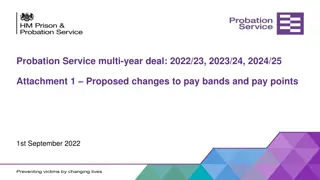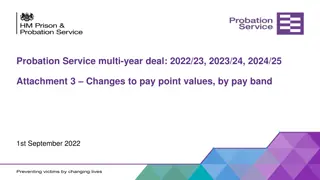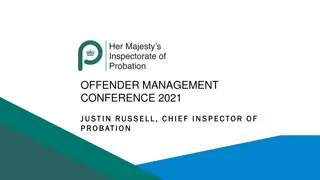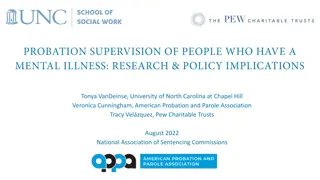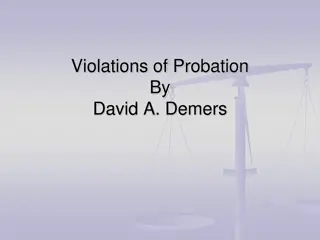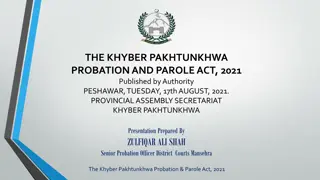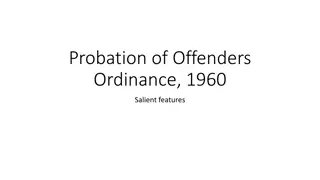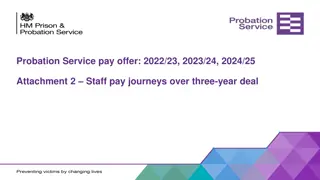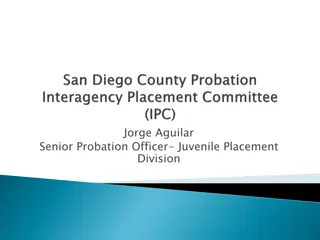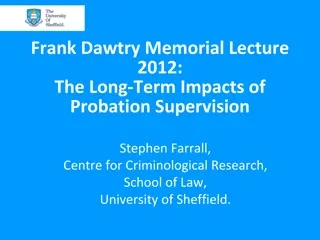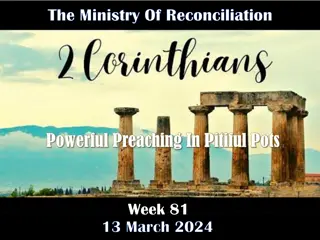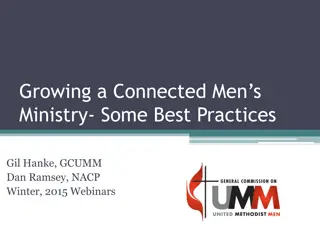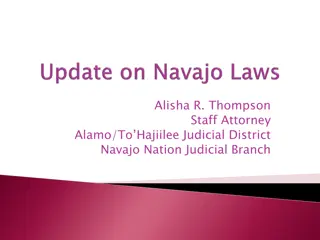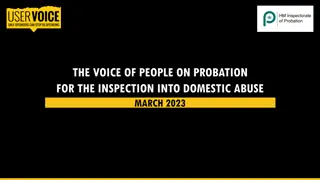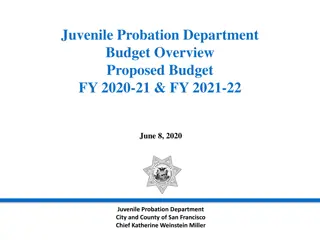Pardon vs Probation in Ministry
Theological and practical aspects of ministry in Second Corinthians, focusing on forgiveness, discipline, and spiritual growth. Delve into the differences between pardon and probation in the context of justice and restoration within a Christian community.
Download Presentation

Please find below an Image/Link to download the presentation.
The content on the website is provided AS IS for your information and personal use only. It may not be sold, licensed, or shared on other websites without obtaining consent from the author. Download presentation by click this link. If you encounter any issues during the download, it is possible that the publisher has removed the file from their server.
E N D
Presentation Transcript
The Crucial Concerns of Ministry The Crucial Concerns of Ministry Confusing Pardon with Probation Confusing Pardon with Probation Week 78 07 February 2024
2 CORINTHIANS INTRODUCTION As we embark upon this study in Second Corinthians, remember that the theme of this letter revolves around both the theological concepts and the practical aspects of Christian living. This primary issue in Corinth was the recognition of authentic ministry and submission to apostolic authority. Paul corrective is to provide guidance and encouragement as the church navigates the challenges that continue to influence their unity, discipline, and spiritual growth. In our study, Paul addresses a situation involving discipline and forgiveness related to the punishment of an individual in the Corinthian congregation. He urges the church to reaffirm their love and forgiveness towards this individual, so that this person would not be overcome by discouragement.
2 CORINTHIANS - LESSON OVERVIEW Pardonand Probation are two distinct legal concepts in the application of justice; each serves different purposes. What s the difference between a pardon and probation? PARDON: Is an expression of forgiveness. An official act of forgiveness granted by an executive authority to someone who has committed a crime. It typically restores certain rights and privileges that were lost due to a criminal conviction. It does not expunge or erase the conviction; it indicates that the granting authority believes the individual deserves forgiveness. It allows the person to be relieved of all legal consequences of the conviction.
2 CORINTHIANS - LESSON OVERVIEW What s the difference between a pardon and probation? PROBATION: Is a period of observation. It s a criminal verdict that allows a convicted offender to be released subject to certain conditions and restrictions. It requires that an individual released be under official supervision and follow specific rules. If the individual fails to comply with the probationary requirement or rules that person can face additional consequences. probation is a provisional release from the penalty of a conviction. Ultimately, a pardon gives unconditional forgiveness, while
2 CORINTHIANS - LESSON OVERVIEW Swindoll opens this study with a note about forgiveness. He says Some years ago as I was thumbing through the want ads in the Los Angeles Times, I came across a few lines that dripped with emotion. These nine words buried in a sea of black and white, floated from the page and catch my attention. Danny, please come home. Mom and Dad forgive you. I read these words several times and tried to imagine the background of Danny s life. I pictured myself in Danny shoes, discovering these words from his mom and dad that said, We forgive you. I imaged the heartache those anguished parents were feeling. As a parent, it wasn t difficult to track their struggle.
2 CORINTHIANS - LESSON OVERVIEW What did it take to get them to swallow their pride, their judgmental spirit, their anger and bitterness, and to say, We forgive you ? We all know the joy of hearing the words, I forgive you. There is nothing quite as liberating as having a full pardon granted from a parent you ve wronged, a spouse you ve betrayed, a friend you ve let down . . . or the Savior you re disobeyed. Yes! A cool wave of relief washes over our painful, sweltering souls when we hear these words, I forgive you. Sometimes people say, I forgive you, but they really mean, I ll let you back into my life under the following conditions. For them, pardon actually means parole.
2 CORINTHIANS - LESSON OVERVIEW Instead of leaving you feeling liberated, it makes you feel unsettled, watched, and distrusted. Sadly, failure to grant forgiveness to a repentant person can lead to deep wounding, permanent scarring, and a irreparable relationship where harmonious fellowship is left hanging. This is true for interpersonal relationships, including those among believers in the church. In fact, the Christians in Corinth struggled with this very issue, as one of their festering, unresolved conflicts was leading to painful schism in the body of Christ.
2 CORINTHIANS 2:5-6 5But if anyone has caused grief, he has not grieved me, but all of you to some extent not to be too severe. 6This punishment which was inflicted by the majority is sufficient for such a man,
2 CORINTHIANS 2:5-6 The background to this problem in 2:5-6, is likely from First Corinthians 5, where Paul confronts the church about a specific act of sexual immorality they were excusing under the banner of grace. One of the church members was involved in an ongoing incestuous relationship with his stepmother (1Cor. 1:5), a sin not even their pagan neighbors would have tolerated! And, because they had refused to take disciplinary action against this infectious disease of immorality, Paul instructed them to remove this immoral man from the church as an act of discipline (1Cor. 5:11-13). However, somewhere between then and now perhaps in response to Paul s second letter (2:4) . . .
2 CORINTHIANS 2:5-6 Some in the congregation had mistaken Paul s firm instructions as a permit not only for immediate and decisive action against the perpetrator, but as permission for strong, even humiliating treatment. The Corinthians first made the mistake by proudly condoning the immorality with a complete lack of remorse. Now the pendulum seems to have swung to the opposite error. They arrogantly condemn the immoral person, even though he had sincerely repented and sought reconciliation! Even if this was not the same person, the key element Paul is addressing is: A sinning person who had been severely and sufficiently disciplined by the church, resulting in repentance . . . should be forgiven!
2 CORINTHIANS 2:5-6 But, instead of forgiving him, they kept him at arm s length. Instead of extending him a gracious pardon, they put him on graceless probation. Paul acknowledges that the man had caused sorrow not only to him, but also to the entire congregation (2:5). Yet, Paul suggests that the punishment he had already endured from the majority of the church was sufficient for his particular actions (2:6).
2 CORINTHIANS 2:7-9 7so that, on the contrary, you ought rather to forgive and comfort him, lest perhaps such a one be swallowed up with too much sorrow. 8Therefore, I urge you to reaffirm your love to him. 9For to this end I also wrote, that I might put you to the test, whether you are obedient in all things.
2 CORINTHIANS 2:7-9 How hard is it for us as believers to accept the repentance of a fellow believer who has caused us harm and hurt. Even after that person has endured the discipline that was due because of sin, the person should have been restored to spiritual health and fellowship. The memories of that sin can continue to prompt unwarranted distrust, unreasonable fear, and a lingering bitterness. But these things contrary to love and grace have nothing to do with authentic forgiveness. Admittedly, some serious offense and addictions require the body of Christ to suspend some repentant believer from full participation in church ministry and service.
2 CORINTHIANS 2:7-9 In fact, criminal offenses could very well lead to further consequences well beyond the control of the church. Nevertheless, when the church approaches each case with the goal of forgiveness and reconciliation, hope for recovery can be found in the most bleak of circumstances. In every case, wisdom and prudence along with love and grace are needed. The man who had caused the trouble no longer needed discipline; he needed forgiveness! Notice the process that had already played out: The man s sin had harmed the reputation of the congregation (2:5). The church reprimanded the sinner and instituted server punishment (2:6).
2 CORINTHIANS 2:7-9 The church put the sinner out of the church and withdraw spiritual and material support (2:6). Genuine repentance led to excessive sorrow by the sinner (2:5-7). These signs of authentic remorse and contrition should have inspired the church s forgiveness, comfort, and love (2:7-8). Yet at this crucial time, the process of reconciliation broke down. In the previous letter, Paul had to forced the church to act against the sinner. Here, he find himself having to serve as the sinner s advocate. Paul from executing the prosecution to coming to the offender defense. What a turn of events! This chaotic church had pushed
2 CORINTHIANS 2:7-9 To prevent the repentant brother from being overwhelmed by excessive sorrow, Paul exhorts the church in Corinth to forgive and comfort him (2:7), and to affirm [their] love for him (2:8). Paul had previously ordered that the sinner be removed from the church. Now, he is commanding them to readmit him without delay or reservation. This new admonition must have come as a surprise, since response that the Corinthians seemed reluctant to make. The circumstances had changed, requiring a change in those wielding the exacting gavel of judgment in Corinth. Paul s new apostolic decree may not have made sense to
2 CORINTHIANS 2:7-9 While some in Corinth thought that Paul wanted reconciliation, others may have thought he wanted to purge the church of all leaven. Now, Paul s new instructions may have appeared to reveal a flip-flop in his guidance, even though it was completely consistent with the principles of church discipline as a means of reconciliation, not condemnation. In the midst of this confusion, the second letter arrives. Corinthians would be obedient in all things (2:9). Paul s new instruction becomes a test to see if the sense to the church, or may even appear, on the surface, to contradict Paul s earlier policy of church discipline. Even in commands that don t seem to make a lot of
2 CORINTHIANS 2:10-11 10Now whom you forgive anything, I also forgive. For if indeed I have forgiven anything, I have forgiven that one for your sakes in the presence of Christ,11lest Satan should take advantage of us; for we are not ignorant of his devices.
2 CORINTHIANS 2:10-11 Now, Paul presents his own forgiving attitude and actions as an example to emulate (2:10). As their father in the faith, Paul assures them that his own policy of forgiveness for the truly repentant should give them confidence that when they act with the same spirit of and mercy, Paul will have their backs. Forgiveness, like discipline, is not self-seeking. In fact, it can be difficult. Nevertheless, Paul tells the Corinthians that his pattern of forgiveness is for your sakes in the presence of Christ, not for his own personal gain (2:10). not make the forgiven sinner squirm a little to show how much others have suffered because of the sin? Why is full and prompt forgiveness so important? Why
2 CORINTHIANS 2:10-11 Why not let the repentant individual wallow just a little longer in uncertainty and experience the anguish of alienation as a deterrent to making the same mistake again? Because withholding forgiveness gives Satan an opportunity to take advantage of us (2:11). It allows the devil to slither his way into a situation in which an individual or church refuses to extend full pardon to truly repentant sinners. And if the process of reconciliation breaks down, the enemy finds a way to further sabotage the situation. But when the process is strengthened by mercy and grace, the enemy will have no opportunity to stir up resentment, anguish, sorrow, bitterness, rebellion or schisms.
2 CORINTHIANS 2:10-11 None of Satan s evil schemes and conniving plans to deceive and destroy will succeed. In the case of the Corinthians, the adversary had deceived them into thinking that church discipline is all judgment and nomercy, all punishment and nograce. God s goal is not ridding the church of sinners, but is reconciling sinners back to the church. When we forget that, we are no longer pursuing the Lord s will, but rather the devil s wiles.
APPLICATIONS OF THE LESSON Pardon, not Parole
APPLICATION PARDON, NOT PAROLE In closing, Swindoll says Paul s correction of the pendulum-swinging Corinthians can be summed up in one simple sentence that we all would do well to memorize: Our forgiveness should be as swift as our discipline was severe. This applies to forgiveness among friendships, marriage and family relationship, and church membership. Paul in his admonition to the believers in Corinth, gives us threepracticalprinciples regarding forgiveness: First True repentance calls for immediate and full forgiveness. He s not talking about hasty forgiveness based on cheap repentance in the form of a flippant, Hey, I m sorry! or a coerced confession.
APPLICATION PARDON, NOT PAROLE He s talking about true repentance: the kind you can see in their eyes, hear in their tone of voice, and sense in their personal brokenness. When a person s heart is pierced by genuine conviction, the sense of shame and unworthiness can be almost overwhelming. It s Obvious. The prodigal wanted to come back home a servant rather than a son (Luke 15:18-19). And those of us who have been injured or offended by the sinner s actions might be tempted to take him up on the offer, but we need to resist that. The body of Christ has no probation period for repentant sinners. True repentance, heartfelt not a shallow imitation calls for restoration and celebration.
APPLICATION PARDON, NOT PAROLE Second Full forgiveness is demonstrative, not theoretical. It is not something we think or feel, but something we do. Paul, in 2:7-8, said they were to forgive, comfort, and reaffirm. We forgive when we speak words or liberation to the offender: I forgive you. And put it behind us and move on. We comfort when we come alongside those who offended us, forgive them for their wrongs, and offer to help them rebuild and strengthen areas of weakness. We reaffirm when we restore them to their former level of relationship, invite and involve them in our lives, and trust them with the rights and privileges they had before.
APPLICATION PARDON, NOT PAROLE Every time we forgive, we take a risk. They may fail again. We may have placed our trust in an unreliable soul. But that s Grace! Grace is risky. Third To hold back forgiveness invites trouble from the adversary. When we refuse to forgive a genuinely repentant sinner, that person can fall into a downward spiral. Intense sorrow can lead to confusion, fruitlessness, and doubts about one s standing before God. This, in turn, can lead to unbiblical approaches to the Christian life. What must I do to redeem myself? How can I make myself acceptable to God and others? Ultimately, frustration and bitterness set in. This is a path paved by the adversary.
APPLICATION PARDON, NOT PAROLE Are you holding a grudge? Or holding something over someone who hurt you in the past, but genuinely repented? If so, you need to cancel the debt immediately, express your unconditional forgiveness, and begin to restore that relationship. Is there somebody who still needs to hear and feel your forgiveness, comfort, and reaffirmation? What is preventing you from offering that person healing mercy and grace. Is your unforgiving attitude toward someone resulting in their exasperation or desperation? Are they obsessed with gaining your approval? Perhaps a child, a spouse, or a parent. Release them so they do not become a target for Satan s twisted temptations.
NEXT CLASS 21 February 2024 Before next class, read the below chapters in Before next class, read the below chapters in the the NKJV NKJV and in one other versions of the Bible, and in one other versions of the Bible, i.e., i.e., KJV KJV, , NRSV NRSV, , NIV NIV, , CEV CEV, , etc etc Chapter 2:12 17 What s That Smell?
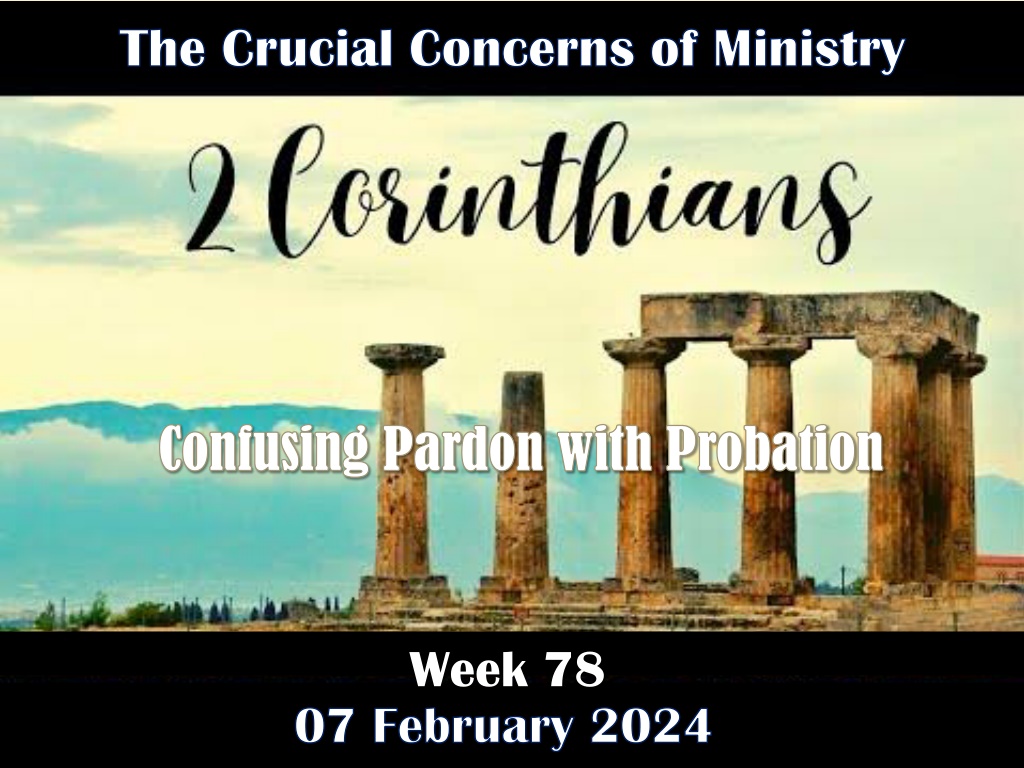
 undefined
undefined





 undefined
undefined



